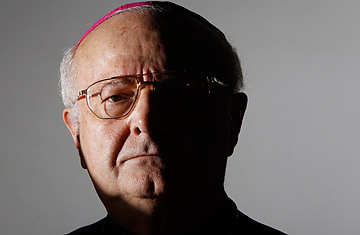
Archbishop Robert Zollitsch, head of the German Bishops' Conference, attends a news conference at the Vatican March 12, 2010.
Already reeling from a series of sexual abuse accusations, Germany's Catholic Church has taken another hit, and this time the scandal has reached into the upper echelons of the organization. On Monday, German prosecutors confirmed that they've launched a preliminary criminal investigation into allegations that the head of Germany's Catholic Church, Archbishop Robert Zollitsch, was an accessory to the sexual assault of children.
The case threatens to further deepen a crisis that has already tainted the image of the Catholic Church in Germany, not least because, as head of the German Bishops' Conference, Zollitsch is tasked with dealing with the sex abuse scandal. Prosecutors say that in 1987, Zollitsch re-appointed a priest who was facing abuse allegations to work in a monastery in Birnau, in southern Germany by Lake Constance. "According to the complaint filed by a man at the end of May, Archbishop Zollitsch assigned further work to a priest ... despite knowing that this priest had sexually abused children in the past," Wolfgang Maier, the senior public prosecutor in the south German city of Freiburg, tells TIME.
Prosecutors allege that Zollitsch, who's also Archbishop of Freiburg in southwest Germany, was in charge of personnel issues in the archdiocese, which includes Birnau, in 1987, and according to the criminal complaint, he was responsible for approving a decision to re-assign the priest. "It's alleged that at least four children were sexually abused by this priest and the man who filed the criminal complaint claims he was also abused," says Maier.
The details of the case are still unclear, but the Freiburg archdiocese has dismissed the allegations as "sensationalist," and says that Zolltisch had nothing to do with appointing the priest — that was the job of the priest's religious order, the Cistericans. "These claims are unsubstantiated," says spokesman Robert Eberle. "Archbishop Zollitsch ... didn't know about the sexual abuse allegations and he wasn't responsible for appointing the priest," he says. Eberle confirms that there was a case of alleged sexual abuse involving the priest that dated back to the 1960s. But he says it wasn't until late 2006 that the Freiburg archdiocese discovered the allegations, at which point church officials immediately informed the Cistercians.
The Roman Catholic Church in Germany is already under intense public scrutiny, after a turbulent few months that began with the first cases of sexual abuse emerging at Berlin's elite Jesuit school, Canisius College, at the end of January. Since then, dozens of victims of alleged abuse have come forward at churches and Catholic institutions across the country, many of them in the south German state of Bavaria, where Pope Benedict XVI was born.
There were allegations of abuse at the school linked to the world-famous Regensburg choir which the Pope's brother, Georg Ratzinger, led for 30 years. And questions were raised over the Pope's role in the transfer of a paedophile priest, identified only as "Father H.," who in 1980 was allowed to resume pastoral work, which included working with children, despite repeated warnings from his psychiatrist to church officials. It wasn't until March of this year that Father H. was suspended after a German newspaper uncovered his unsavoury past.
Then in April, the abuse scandal claimed what was, up to that point, its most prominent figure in Germany — the controversial and conservative Bishop of Augsburg, Walter Mixa, who resigned after facing allegations that he had sexually abused a boy and hit children at a Catholic-run orphanage in the 1970s and '80s. (Mixa denies the allegations.) And last week, on May 27, an official report found at least 205 former students who claimed they'd been abused at Jesuit schools across Germany — and the special investigator said she feared there could be many more cases.
While prosecutors caution that their investigation against Zollitsch is still at an early stage and is based on allegations by a single accuser, Catholic lay organisations are urging the Church to reveal all the facts of the case. "We still don't know the full story," says Christian Weisner, spokesman for the Catholic lay group We Are Church. He wants Zollitsch to face the press and make a personal statement. "Responsibility for this incident has been shifted to the Cistercian order and there are many unanswered questions." So far, Zollitsch has remained silent. But the criticism of how Germany's Catholic Church is handling the growing abuse crisis is only getting louder.
